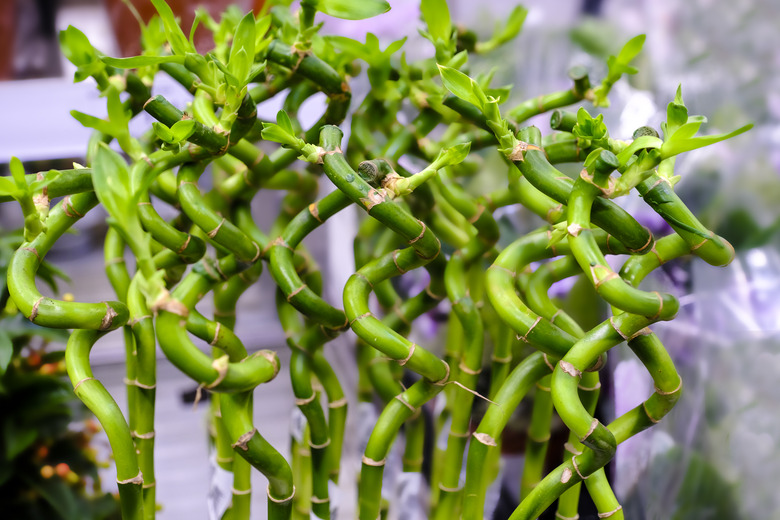Is The Lucky Bamboo Plant A Good Clean Air Plant?
Every now and then, another article pops up claiming that houseplants are fantastic for cleaning toxins from indoor air. The problem is that this isn't true. The lucky bamboo plant (Dracaena sanderiana) is not a clean air plant for removing household toxins. In fact, no plant is.
Tip
Lucky bamboo plants aren't good clean air plants, but no other plant is either. Buy houseplants because you love them, not because you need to breathe easier.
Unpacking the “Clean Air” Myth
Since the 1970s, houseplants have been cited as a healthy addition to any home, largely because of the belief that they filter the air. The truth is that if you want to filter your household air, you should get yourself an air purifier. In fact, having too many plants in a room where they're not being properly dusted or periodically wiped down can be as triggering for allergies as not vacuuming or doing other household cleaning.
The clean air myth wasn't an effort to dupe consumers; it's just unrealistic science. A NASA researcher's study claimed that plants could be a solution to indoor air pollution. However, the study stuck plants in a narrow, 2-foot-long sealed tank. It's one thing to reach a result in a hermetically sealed container, but replicating that result in a household is a whole other thing. In a home, bacon is burning, surfaces are sprayed with disinfectant, people exhale carbon dioxide, barbecue smoke drifts in off the patio and so on, with toxins continuously replenishing.
Plants simply can't change the air at the pace required to keep up with daily life. To filter out all those toxins from daily life, you'd need at least 10 houseplants per square metre in order to replicate NASA's results. In fact, it'd be somewhere between 500 and 50,000 plants you'd need for a 500-square-foot apartment.
The Growing Popularity of Houseplants
Even before 2020's pandemic, indoor gardening had taken off like a rocket. Millennials fell in love with houseplants and indoor gardening. Whether it's aesthetics, the routine of caring for them or the misguided belief that they clean the air, houseplants were already growing in popularity, but the pandemic made it hard for nurseries to keep up with demand.
In 2019, Bloomberg reported that the houseplant business had shot up over 50 percent in revenue over three years, raking in $1.7 billion in 2018. Speculation has it that with more people delaying having children, houseplants are the no-fuss pet that keeps giving back. And they look great on Instagram too, where the hashtag "houseplants" has over 5.4 million posts.
Plants aren't that scary, and keeping them healthy comes down to being attentive and knowing some plant-care hacks to keep them thriving.
The Impact of Houseplants on Health
While the NASA study that spawned so many specious claims over the last three decades has been soundly debunked, houseplants are indeed good for your health — your mental health, that is. They're great for productivity in offices and schools, as they help people to feel more focused and relaxed than they would with no greenery around them.
They're terrific for numerous mental health conditions, from PTSD and depression to dementia and ADHD, because — in the simplest of terms — natural elements are natural for humans. They look great in any space, and they're a welcome distraction for those who might not be able to get out in nature as much as they'd like.
No matter who you are, houseplants are a healthy distraction. In troubling times, there's a lot to gain from knowing your care is keeping that plant alive. Whatever else may transpire around you, at least your lucky bamboo has new leaves and looks vibrant. However, if it's the air that needs freshening to help with allergies or lung ailments, start looking for air purifiers because lucky bamboo won't get you breathing more easily.
References
- Psychology Today: 11 Ways Plants Enhance Your Mental and Emotional Health
- Bloomberg: The One Thing Millennials Haven't Killed Is Houseplants
- The Atlantic: A Popular Benefit of Houseplants Is a Myth
- Journal of Exposure Science & Environmental Epidemiology: Potted plants do not improve indoor air quality: a review and analysis of reported VOC removal efficiencies
- NASA: Interior Landscape Plants for Indoor Air Pollution Abatement
